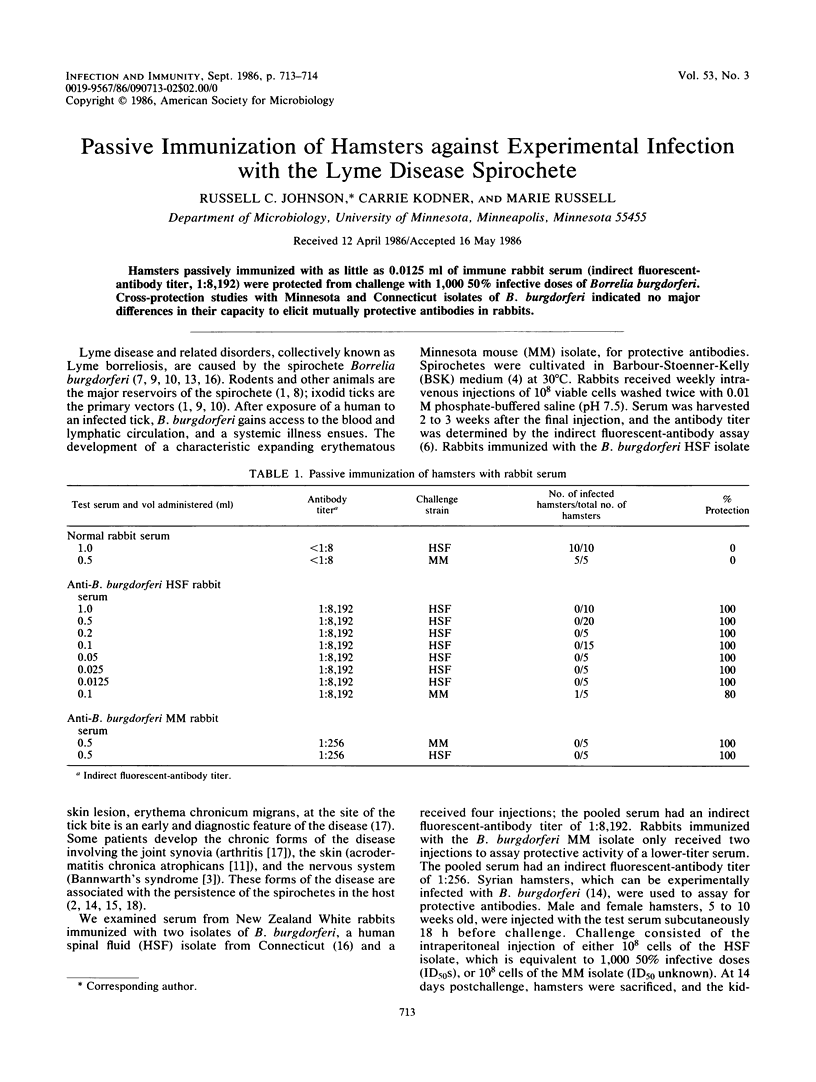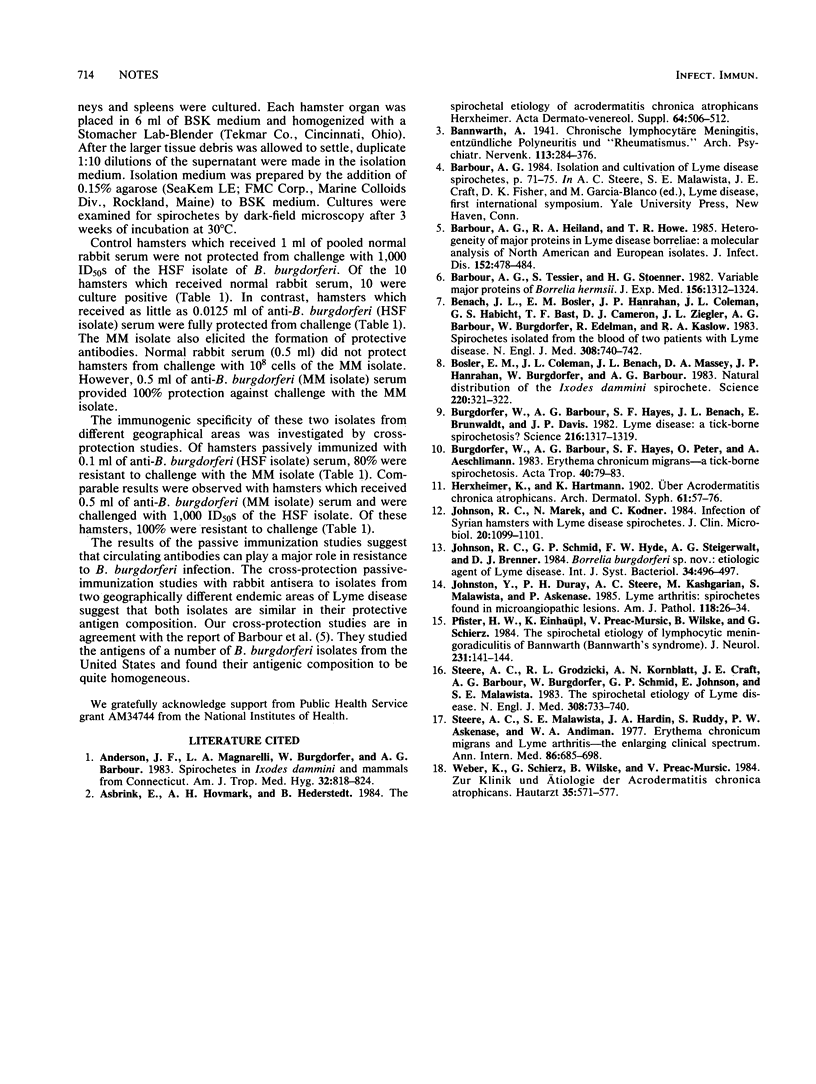Abstract
Hamsters passively immunized with as little as 0.0125 ml of immune rabbit serum (indirect fluorescent-antibody titer, 1:8,192) were protected from challenge with 1,000 50% infective doses of Borrelia burgdorferi. Cross-protection studies with Minnesota and Connecticut isolates of B. burgdorferi indicated no major differences in their capacity to elicit mutually protective antibodies in rabbits.
Full text
PDF

Selected References
These references are in PubMed. This may not be the complete list of references from this article.
- Anderson J. F., Magnarelli L. A., Burgdorfer W., Barbour A. G. Spirochetes in Ixodes dammini and mammals from Connecticut. Am J Trop Med Hyg. 1983 Jul;32(4):818–824. doi: 10.4269/ajtmh.1983.32.818. [DOI] [PubMed] [Google Scholar]
- Asbrink E., Hovmark A., Hederstedt B. The spirochetal etiology of acrodermatitis chronica atrophicans Herxheimer. Acta Derm Venereol. 1984;64(6):506–512. [PubMed] [Google Scholar]
- Barbour A. G., Heiland R. A., Howe T. R. Heterogeneity of major proteins in Lyme disease borreliae: a molecular analysis of North American and European isolates. J Infect Dis. 1985 Sep;152(3):478–484. doi: 10.1093/infdis/152.3.478. [DOI] [PubMed] [Google Scholar]
- Barbour A. G., Tessier S. L., Stoenner H. G. Variable major proteins of Borrellia hermsii. J Exp Med. 1982 Nov 1;156(5):1312–1324. doi: 10.1084/jem.156.5.1312. [DOI] [PMC free article] [PubMed] [Google Scholar]
- Benach J. L., Bosler E. M., Hanrahan J. P., Coleman J. L., Habicht G. S., Bast T. F., Cameron D. J., Ziegler J. L., Barbour A. G., Burgdorfer W. Spirochetes isolated from the blood of two patients with Lyme disease. N Engl J Med. 1983 Mar 31;308(13):740–742. doi: 10.1056/NEJM198303313081302. [DOI] [PubMed] [Google Scholar]
- Bosler E. M., Coleman J. L., Benach J. L., Massey D. A., Hanrahan J. P., Burgdorfer W., Barbour A. G. Natural Distribution of the Ixodes dammini spirochete. Science. 1983 Apr 15;220(4594):321–322. doi: 10.1126/science.6836274. [DOI] [PubMed] [Google Scholar]
- Burgdorfer W., Barbour A. G., Hayes S. F., Benach J. L., Grunwaldt E., Davis J. P. Lyme disease-a tick-borne spirochetosis? Science. 1982 Jun 18;216(4552):1317–1319. doi: 10.1126/science.7043737. [DOI] [PubMed] [Google Scholar]
- Burgdorfer W., Barbour A. G., Hayes S. F., Péter O., Aeschlimann A. Erythema chronicum migrans--a tickborne spirochetosis. Acta Trop. 1983 Mar;40(1):79–83. [PubMed] [Google Scholar]
- Johnson R. C., Marek N., Kodner C. Infection of Syrian hamsters with Lyme disease spirochetes. J Clin Microbiol. 1984 Dec;20(6):1099–1101. doi: 10.1128/jcm.20.6.1099-1101.1984. [DOI] [PMC free article] [PubMed] [Google Scholar]
- Johnston Y. E., Duray P. H., Steere A. C., Kashgarian M., Buza J., Malawista S. E., Askenase P. W. Lyme arthritis. Spirochetes found in synovial microangiopathic lesions. Am J Pathol. 1985 Jan;118(1):26–34. [PMC free article] [PubMed] [Google Scholar]
- Pfister H. W., Einhäupl K., Preac-Mursic V., Wilske B., Schierz G. The spirochetal etiology of lymphocytic meningoradiculitis of Bannwarth (Bannwarth's syndrome). J Neurol. 1984;231(3):141–144. doi: 10.1007/BF00313682. [DOI] [PubMed] [Google Scholar]
- Steere A. C., Grodzicki R. L., Kornblatt A. N., Craft J. E., Barbour A. G., Burgdorfer W., Schmid G. P., Johnson E., Malawista S. E. The spirochetal etiology of Lyme disease. N Engl J Med. 1983 Mar 31;308(13):733–740. doi: 10.1056/NEJM198303313081301. [DOI] [PubMed] [Google Scholar]
- Steere A. C., Malawista S. E., Hardin J. A., Ruddy S., Askenase W., Andiman W. A. Erythema chronicum migrans and Lyme arthritis. The enlarging clinical spectrum. Ann Intern Med. 1977 Jun;86(6):685–698. doi: 10.7326/0003-4819-86-6-685. [DOI] [PubMed] [Google Scholar]
- Weber K., Schierz G., Wilske B., Preac-Mursic V. Zur Klinik und Atiologie der Acrodermatitis chronica atrophicans. Hautarzt. 1984 Nov;35(11):571–577. [PubMed] [Google Scholar]



